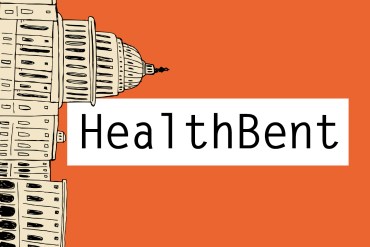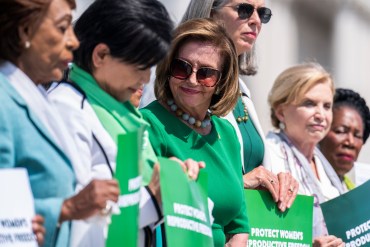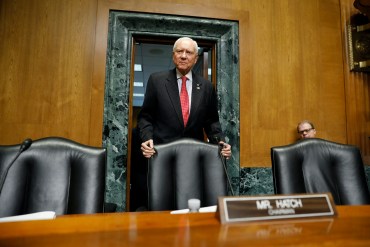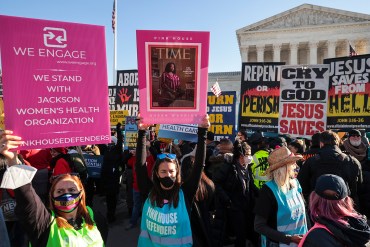Why Medication Abortion Is the Top Target for Anti-Abortion Groups in 2026
With abortions still on the rise nationwide despite widespread bans, curtailing the use of pregnancy-terminating medication is a top priority for abortion opponents — and they’re frustrated that the Trump administration isn’t doing more to limit its use.
To Cut Medicaid, the GOP’s Following a Path Often Used To Expand Health Care
Republicans are attempting to use the budget reconciliation process to boost President Donald Trump’s priorities and reduce health coverage. That process has been used to pass nearly every major piece of health legislation for decades — except usually lawmakers use it to expand health care, not cut it, writes Julie Rovner.
Trump’s Already Gone Back on His Promise To Leave Abortion to States
On the campaign trail, President Donald Trump said the power to make abortion policies “has been returned to the states.” In his first two weeks in office, he’s already gone further to restrict abortion than any president who’s held office since the 1973 “Roe v. Wade” decision, writes Julie Rovner.
Trump Doesn’t Need Congress To Make Abortion Effectively Unavailable
President-elect Donald Trump vowed on the campaign trail not to sign a nationwide abortion ban. But he wouldn’t need to do so to make abortion difficult, or illegal, writes KFF Health News’ chief Washington correspondent, Julie Rovner.
Republicans Are Downplaying Abortion, but It Keeps Coming Up
Torn between a base that wants more restrictions on reproductive health care and a moderate majority that does not, it seems many Republicans would rather take an off-ramp than a victory lap when it comes to abortion. But they can’t escape talking about it.
Abortion Bans Are Driving Off Doctors and Closing Clinics, Putting Basic Health Care at Risk
Doctors say they are reluctant to practice in abortion-banned states, where making the best decision for a patient could run afoul of the law. Even former President Donald Trump’s surgeon general is concerned about the repercussions for women’s health, writes KFF Health News’ chief Washington correspondent, Julie Rovner.
Doctors’ Lesson for Drug Industry: Abortion Wars Are Dangerous to Ignore
The American Medical Association ducked the abortion issue for years and now sees its members’ professional opinions second-guessed by lawmakers and judges. PhRMA is following the same playbook.
Why Do Politicians Weaponize Medicare? Because It Works
Politicians are again pointing fingers over who wants to cut Medicare. As past Washington brawls show, the party accused of threatening popular entitlements tends to lose elections — although it’s the beneficiaries relying on lawmakers to fund it who stand to lose the most.
Ask Voters Directly, and Abortion Rights Wins Most Ballot Fights
Anti-abortion candidates have fared well in recent elections. But decades of ballot initiatives — including a half-dozen measures considered after the Supreme Court overturned Roe v. Wade last June — show that when voters are asked directly, they usually side with preserving abortion rights.
Three Things About the Abortion Debate That Many People Get Wrong
The commonly repeated myths include arguments that only women who are pregnant are affected by the decision overturning Roe v. Wade, that Democratic lawmakers could have codified abortion protections before, and that Congress can easily get rid of federal laws restricting abortion.
Conservative states are moving to severely restrict abortions, and many are pressing for bans that provide no exception for cases of rape or incest or even to save the life of the mother. But public opinion polls suggest those limits could cause blowback.
Historic ‘Breach’ Puts Abortion Rights Supporters and Opponents on Alert for Upcoming Earthquake
An opinion published by Politico confirms what many who have followed the abortion debate already suspected: Roe v. Wade is soon to be no more. But the question remains: How will the public respond?
Sen. Orrin Hatch’s Legacy Tracks the GOP’s Evolution on Health
The man who forged a successful working relationship with Democratic health giants, such as Sen. Edward Kennedy and Rep. Henry Waxman, fell back on his deep conservative roots as opposition grew to the Affordable Care Act and the administration of President Barack Obama.
As Red States Push Strident Abortion Bans, Other Restrictions Suddenly Look Less Extreme
The Supreme Court’s conservative majority has yet to make clear its stand on Roe v. Wade. But state lawmakers aren’t waiting to consider a variety of extreme measures: bills that would ban abortions in cases of ectopic pregnancies, allow rapists’ families to object to terminating a victim’s pregnancy, or prohibit the procedure in the case of fetal disability. Do these proposals make the less extreme restrictions seem more mainstream?
Fast-Tracked Ruling on Abortion Won’t Wait for ‘Hearts and Minds’ to Change
Public opinion remains bitterly divided on the issue as a Supreme Court decision is imminent that could overturn or dramatically undercut Roe v. Wade.
Collins’ Skillful Piloting Helped NIH Steer Clear of Political Minefields
Dr. Francis Collins, who announced he is stepping down as chief of the National Institutes of Health, used his communication skills and political insights to help protect the highly acclaimed federal research institutes through difficult times.
Democrats Roll the Dice on Sweeping Abortion Rights Bill — Again
Capitol Hill lawmakers mobilize to support a bill that would write abortion protections into federal law. Unlikely to succeed, the exercise follows a tactic that proved unsuccessful in 1992.
Why Doesn’t Medicare Cover Services So Many Seniors Need?
When the program began half a century ago, backers believed the benefits would expand over time, but politics and concerns about money have stymied most efforts. Now congressional Democrats are looking to add vision, dental and hearing care.
Biden Is Caught in the Middle of Polarizing Abortion Politics
The president, one of the last of a disappearing group of politicians who sought moderate compromises on abortion policy, is frustrating supporters. They wanted faster changes in federal rules. But abortion opponents — including Catholic bishops— are also taking him to task.
Democrats Disagree About How to Spend Potential Prescription Drug Windfall
After a year of uncharacteristically being on the same page when it comes to health care, Democratic lawmakers are at loggerheads about what to do next. Most agree the time is ripe to tackle high drug prices. But they divide over whether to take savings from that to move to a ‘Medicare for All’ insurance system, enhance the current Medicare program or strengthen benefits under the Affordable Care Act.

















